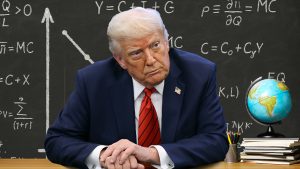
‘My Father’s Shadow’ Review: Cannes’ First Nigerian Movie Mixes Autobiography and Mystery
The line “I’ll see you in my dreams” is repeated frequently in Akinola Davies Jr.’s “My Father’s Shadow,” the first film from a Nigerian director to earn a slot in the Cannes Film Festival’s official selection. And in that line, perhaps, is the heart of a standout film.
Dreams and ghosts figure heavily into the film, which premiered in the Un Certain Regard section of the festival on Sunday. While on the surface the drama follows a day trip taken by two young boys and their father to the Nigerian capitol of Lagos, the film slides between reality and imagination, between the natural world and the spiritual one. It’s a rhapsody of sorts, but a rough one; it examines the nuts and bolts of a family dynamic, but leaves room for mystery and is beautifully elusive.
“My Father’s Shadow” opens with a reverie that mixes scenes from the natural world —flies buzzing, ants swarming, wind blowing — with two young boys, ages 8 and 11 (brothers Godwin Egbo and Chibuike Marvellous Egbo), in a small village is Nigeria in 1993. Their father, Fola (Ṣọpẹ́ Dìrísù), shows up, which apparently isn’t as regular an occurrence as they’d like, and he impulsively invites them on a day trip to Lagos, where he needs to collect a paycheck for work he’d done for an upcoming presidential election.
That election was the country’s first since a military dictatorship assumed power a decade earlier, and it was a tightly contested race between the military ruler, Ibrahim Badamasi Babangida, and challenger Moshood Kashimawo Olawale Abiola (aka MKO) of the Social Democratic Party. The election was closely watched around the world to see if Nigeria could hold an open and free election – but it was also closely watched in Akinola Davies’ home, with the director basing much of the film on his own memories of the time.
On the bus to Lagos, the kids overhear talk of a recent massacre, which is alternately condemned as a slaughter of unarmed pro-democracy protestors and dismissed as “election propaganda.” The fact that people were killed is not in dispute, but the numbers are, though Fola isn’t in the mood to talk about it with his kids. (His frequent nosebleeds are also a sign that he’s perpetually uneasy.)
The trip is low-key but foreboding; everyone the family encounters seems convinced that their candidate, MKO will win, but uncertain if the incumbent will yield power. The film flits from one gathering to another as Fola tries to find somebody who can pay him for the work he’s done, carving out time in between to hang out with the kids and show them the sights of a big city, including an amusement park that they find thrilling.
The action meanders, but there’s always an undercurrent of dread. And while many of the episodes are down to earth, the filmmaking lets things flow from image to image with lines that search for deeper truths but don’t advance the plot. “My Father’s Shadow” can also be reminiscent of recent African films like “Atlantics” and “Dahomey,” with their blurred lines between the living and the dead.
Any sense of reverie, though, is dashed when a TV newscaster announces that the ruling party has annulled the election results, claiming fraud. Everyone in Fola’s circle is enraged and distraught, and the trip back to the village becomes a nightmare when a soldier at a military blockade is sure that he knows Fola from somewhere. Are these childhood memories, dreams or something worse? “My Father’s Shadow” drops clues but not answers, and this tender drama is all the better for it.











